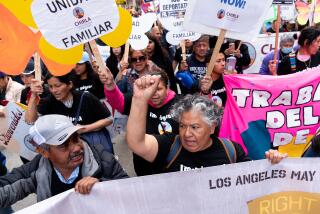Trump must allow return of U.S.-born woman who joined Islamic State, father says in lawsuit
The father of a New Jersey-born woman who joined Islamic State but now wants to return to the U.S. with her 18-month-old son has filed court action against the Trump administration, saying that his daughter is a U.S. citizen who must be allowed back home.
Hoda Muthana, 24, left college in Alabama in 2014 and married an Islamic State fighter after arriving in Syria. She fled Islamic State-controlled territory last December and has been detained in Syria by Kurdish forces at a refugee camp with her Syrian-born son, according to the complaint filed Thursday in federal court in Washington.
Although Muthana once heartily praised the militant group and denounced the U.S., she has since openly renounced Islamic State and said she wants to return even though she would likely face criminal prosecution.
At the heart of the legal battle is an issue involving U.S. citizenship rights. The case also raises questions about how Western governments will handle the hundreds of cases of citizens who left to join Islamic State’s self-styled caliphate and were eventually captured as territory controlled by the group in Syria and Iraq dwindled from an area larger than South Carolina to less than a square mile in a remote Syrian hamlet.
The complaint, filed by Ahmed Ali Muthana, a former diplomat from Yemen at the U.N. and now a naturalized American citizen, contends that the Trump administration must recognize his Hackensack-born daughter as a citizen and that she should be allowed to return safely.
On Wednesday evening, President Trump tweeted he would not allow Muthana back into the U.S.: “I have instructed Secretary of State Mike Pompeo, and he fully agrees, not to allow Hoda Muthana back into the Country!”
On Thursday, Pompeo reiterated the point and told NBC’s “Today” that Muthana is not a citizen because her father was a diplomat at the time of her birth.
“She is not a U.S. citizen, nor is she entitled to U.S. citizenship,” he said of Muthana, who married a second ISIS fighter from Tunisia after her first husband, from Australia, died in battle. She eventually gave birth to a boy.
According to the legal complaint, Muthana was born on Oct. 28, 1994, two months after her father was discharged from his position as a diplomat.
When Muthana sought a passport in 2004, the U.S. government initially questioned whether she was eligible because their records showed that her father continued to have diplomatic status at the time of her birth. Under federal law, diplomats from foreign nations cannot claim U.S. citizenship for their offspring born on American soil.
In response, the father provided the government with a letter that stated that his diplomatic status had been terminated before his daughter was born. At the time, the U.S. accepted that document and issued Muthana her passport in 2005 and renewed it in 2014, the complaint said.
But in 2016, when Muthana was in Syria, the U.S. government revoked her passport and claimed for the first time that she was not a U.S. citizen. The government position was that Muthana was issued her passport in error because her father’s departure was not registered until early 1995.
It is not uncommon for foreign diplomats to overstay their legal assignment for some months, U.S. officials say, but if their separation from diplomatic duty has not been registered with the U.S. government, they remain on the books as a diplomat. Such was the case with Muthana’s father, the government now says.
“I’ve never seen a case where someone is recognized as birthright citizenship and then the U.S. government changes its mind,” said attorney Charles Swift, director of the Constitutional Law Center for Muslims in America, who filed the court action on behalf of Muthana’s father.
Muthana’s case underscores the growing problem Western governments face concerning what they will do citizens who have joined the Islamic State.
In February 2018, then-U.S. Defense Secretary Jim Mattis told reporters that foreign nations need to take responsibility for their citizens captured fighting for Islamic State.
Trump expressed similar sentiments last weekend when he tweeted:
“The United States is asking Britain, France, Germany and other European allies to take back over 800 ISIS fighters that we captured in Syria and put them on trial...The alternative is not a good one in that we will be forced to release them.”
His tweet came days after Britain revoked citizenship for Shamima Begum, a woman who also had joined Islamic State.
Times staff writer Tracy Wilkinson in the Washington bureau contributed to this report.
Follow me on Twitter @melissaetehad
More to Read
Sign up for Essential California
The most important California stories and recommendations in your inbox every morning.
You may occasionally receive promotional content from the Los Angeles Times.











